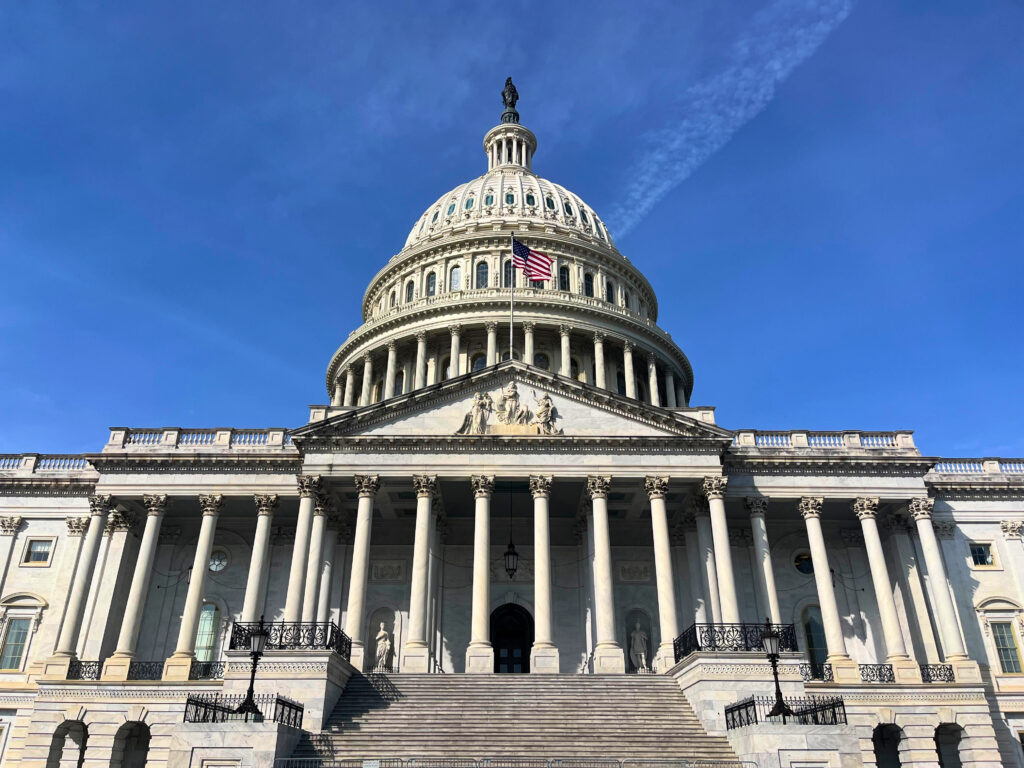
Colorado Rep. Jeff Hurd signed a letter with a group of lawmakers Monday urging fellow Republicans in the leadership of the U.S. House of Representatives to preserve and strengthen Medicaid.
The letter made clear the group’s support for the final budget bill hinges on the issue.
“We cannot and will not support a final reconciliation bill that includes any reduction in Medicaid coverage for vulnerable populations,” it said.
The letter comes as a budget blueprint, which could contain steep Medicaid cuts, makes its way through Congress. The federal-state program covers more than a million Coloradans, about a fifth of the population.
About 228,000 people in Hurd’s district get health care through Colorado's program, called Health First Colorado. That’s 31 percent of the people in the district, the most of any Colorado district. His district covers most of the Western Slope and extends into the south-central part of Colorado.
CPR recently reported on the potential impact of deep Medicaid cuts on one region in the district: the San Luis Valley in south-central Colorado.
“When I was campaigning for Congress, one of the top issues was rural health care, and that's something that matters to me personally, but it's also important to the people of Colorado's third congressional district,” Hurd said in an interview Wednesday with CPR News.
He said he and the others who signed the letter wanted to let leadership of both the House and House Energy and Commerce Committee “know that protecting Medicaid services for those who need it most is a critical priority for us. And that was what was animating my joining in this letter.”
He said he’d been hearing from residents of his district. “I think there's concern generally about what is going to happen with respect to the delivery of these services,” he said. Hurd said he is also telling them that “Social Security is not on the table at all. That's something that is not contemplated at all as part of the budget reconciliation process.”
Hurd was one of a dozen moderate House Republicans to sign the letter, which was sent to House Speaker Mike Johnson and three other members of his leadership team.
The letter notes that the 12 helped deliver the Republican majority and represent districts with high rates of constituents enrolled in the program.
“We would like to reiterate our strong support for this program that ensures our constituents have reliable health care,” the lawmakers wrote. “Balancing the federal budget must not come at the expense of those who depend on these benefits for their health and economic security.”

The letter noted Medicaid must be reformed so it remains strong for years to come and efficiency and transparency must be prioritized for beneficiaries, hospitals and states.
The lawmakers said they support “targeted reforms” to improve the integrity of the program, reduce improper payments, modernize delivery systems to fix flaws that divert sources away from Medicaid participants like children, seniors, those with disability and pregnant women.
Ten hospitals, nearly a quarter of the state's 43 total rural inpatient hospitals, are at risk of closing, CPR reported last month. Three are at immediate risk of closing in the next two to three years.
Eighteen hospitals, or 42 percent, are operating with losses on services.
Cuts to Medicaid promise to threaten the viability of hospitals, nursing homes, and safety-net providers around the country, the letter stated. Many hospitals, especially in rural and underserved areas, rely heavily on Medicaid funding; some get more than half their revenue from the program.
“When hospitals close, it affects all constituents, regardless of health care coverage,” the letter said.
The lawmakers urged House leadership to prioritize care for the country’s most vulnerable populations in order to strengthen the program. They said their constituents are asking for changes that will strengthen the health care workforce, offer low-income working-class families expanded opportunities to save for medical expenses, support rural and underserved communities and help new mothers.
The letter concluded with a second reminder that moderates helped Republicans win the House majority.
“We are committed to working with you to preserve Medicaid and identify responsible savings through deregulation, streamlining federal programs, and cutting administrative red tape,” it stated. “Communities like ours won us the majority, and we have a responsibility to deliver on the promises we made.”
Hurd said Wednesday that Medicaid work requirements could be part of the discussion.
“That's certainly something we'll have to look at,” he said. “Certainly, work requirements is something that I would support, and that I think is one of the areas that I think we can find common ground in finding savings and making sure that, again, the most vulnerable who need these services can continue to rely on them.”
A new analysis from the Urban Institute, funded by the Robert Wood Johnson Foundation, finds as many as 108,000 Coloradans could lose coverage if Congress ties the health program to employment. Most people enrolled in the program are already working or could meet rules for exemption, according to the report.
“Truth is there's not a lot of waste, and it's not simple,” said policy analyst Katherine Hempstead with the Robert Wood Johnson Foundation. “What ends up is really you're taking coverage away from a lot of people that need it and that actually are working.”

Republicans have argued a work mandate encourages enrollees to find employment and reduces their need for public assistance.
The other representatives to sign the letter included: David Valadao of California, Don Bacon of Nebraska, Jefferson Van Drew of New Jersey, Rob Bresnahan, Jr. of Pennsylvania, Juan Ciscomani of Arizona, Jen A. Kiggans of Virginia, Young Kim of California, Robert Wittman of Virginia, Nicole Malliotakis of New York. Nick LaLota of New York, and Andrew R. Garbarino of New York.
A spokesman for Speaker Johnson, Taylor Haulsee, provided a statement via email.
“Through budget reconciliation, House Republicans will strengthen, sustain, and secure Medicaid so we can preserve it for the vulnerable American populations it was designed to serve,” Johnson said. “Unlike our Democrat colleagues, we are committed to making common-sense reforms and rooting out waste, fraud, and abuse to make Medicaid work more efficiently and effectively.”
Democrats have been warning about the devastating impact of potentially deep cuts for weeks.
If they happen, Colorado could lose as many as 12,000 jobs, $1.3 billion in state economic productivity and $82 million in state and local tax dollars in 2026, according to a letter Gov. Jared Polis and Lt. Gov. Dianne Primavera sent Monday to the members of the state’s Congressional delegation.
Others in Colorado backed Hurd’s decision.
Konnie Martin, CEO of San Luis Valley Health said, in an email to CPR, she was grateful Hurd put his name to the letter.
“His advocacy reflects a strong understanding of the challenges that we face in rural health care and the devastating impact proposed Medicaid cuts would have on our community,” she said. “The cuts proposed to Medicaid would have far-reaching economic impacts in our community, as well as other rural and underserved areas around the county that rely on Medicaid funding. Protecting Medicaid is essential to ensuring that we, and other rural health care providers, can continue delivering care to our most vulnerable populations.”
The letter marked a positive advancement, said Alamosa Mayor Ty Coleman. But he said it is “essential” Congressman Hurd commit to opposing and voting against any proposed Medicaid cuts, which would have a “significant negative effect on many individuals in rural communities like ours.”
“I wish Congressman Hurd all the best and genuinely hope he does the right thing by voting against any reduction in Medicaid coverage when the final bill comes up for a vote,” Coleman said, via email. “People in our rural community often say, ‘Actions speak louder than words.’”
“We applaud Rep. Hurd’s strong support of Medicaid to ensure people have access to high quality, reliable healthcare in their rural communities that protects our most vulnerable populations,” said Michelle Mills, CEO of the Colorado Rural Health Center.
| This story is part of a collection tracking the impacts of President Donald Trump’s second administration on the lives of everyday Coloradans. Since taking office, Trump has overhauled nearly every aspect of the federal government; journalists from CPR News, KRCC and Denverite are staying on top of what that means for you. Read more here. |
Invest in a more sustainable future. Support climate solutions reporting.








